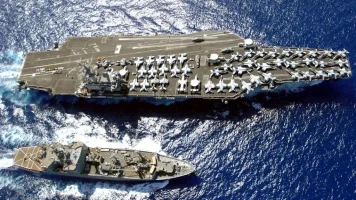- Views: 5K
- Replies: 43

The Indian Navy is poised to select the German-Indian partnership of ThyssenKrupp Marine Systems (TKMS) and Mazagon Dock Shipbuilders Limited (MDL) for the ambitious Project 75 India (P75I) submarine program. This decision comes as German Chancellor Olaf Scholz is scheduled to visit India later this month, accompanied by a delegation that includes TKMS CEO.
P75I aims to bolster India's underwater capabilities with six advanced diesel-electric submarines equipped with Air-Independent Propulsion (AIP) systems. These systems significantly enhance a submarine's stealth and endurance by allowing it to operate submerged for extended periods without needing to surface for air.
The Indian Navy has conducted rigorous field evaluation trials (FET) to assess competing bids. TKMS emerged as a strong contender by successfully demonstrating its mature AIP technology during these trials.
In contrast, the Spanish shipyard Navantia, partnered with Larsen & Toubro (L&T), is not expected to have an operational AIP submarine until 2026. This delay has proven to be a crucial factor in the Indian Navy's decision, as it prioritizes a proven and readily available AIP system to avoid potential program delays and technical risks.
"The requirement of a sea-proven AIP assumes significance since, unless sea-proven, safe and reliable for its designed functionality, the AIP system will expose the programme to significant technical and operational risks,” a senior source explained.
Beyond AIP, the TKMS submarines boast advanced stealth features and cutting-edge sensor and weapons systems. The project also emphasizes technology transfer, with the design being shared with MDL to enhance India's indigenous submarine production capabilities. This aligns with India's broader strategic partnership model for defence procurement, which aims to boost domestic manufacturing and reduce reliance on foreign suppliers.
The first submarine under this project is anticipated to be delivered seven years after the contract signing, with subsequent deliveries expected annually. The project is crucial for modernizing India's aging submarine fleet, which currently faces operational availability challenges.
While no formal agreement is expected during Chancellor Scholz's visit, the German delegation will likely receive updates on the selection process. The final decision rests with the Ministry of Defence, which will review the Indian Navy's recommendations.
This potential deal underscores the growing strategic partnership between India and Germany in the defence sector. It also highlights India's commitment to strengthening its naval capabilities amidst the evolving geopolitical landscape in the Indo-Pacific region.


